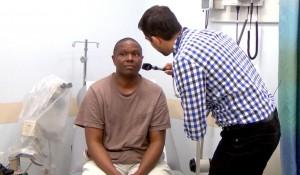For many students, volunteering at the Einstein Community Health Outreach (ECHO) Free Clinic is the first time we get to palpate an abdomen, listen to abnormal heart sounds or even learn to draw blood. These are skills required for us to become physicians, but learning these skills isn’t the reason that most Albert Einstein College of Medicine students volunteer at ECHO. Many of us go into the clinic for the first time with the idea that we are going to “help someone”—that we are going to make a difference. Yet on a regular basis, I would leave the clinic thinking, “Today I got even more than I gave. “
Learning to Become a Health Advocate
My first volunteer position at ECHO was that of a women’s-health patient advocate. My job was to provide health education about topics of interest to my patient.
Let’s be honest: as a medical student only a couple of months into training, I had only so much to teach. My initial patient was a woman who had just moved to New York from Ghana. Within the first 10 minutes of her visit, I had already told her everything I knew about nutrition, exercise and sexually transmitted disease. There was much she needed and wanted to know. Talking to her, I could feel my heart race as I tried to think of other subjects to discuss.
We spent the better part of two hours together—talking about everything from health concerns to family to school, and all that lies in between. The student-doctor/patient relationship that I was learning about in class had suddenly changed dramatically. At some point between getting labs drawn and visiting the social worker, we were no longer “first-year medical student” and “uninsured patient.” We just became two people—both far away from family and both living for the first time in a place with snow.

An Einstein medical student examines a patient at the student-run ECHO clinic.
Sharing Stories, Finding Understanding
She explained how difficult it was to find a job and the hardships that come without U.S. citizenship or eligibility for health insurance. Yes, there was a language barrier, and yes, we were born on opposite sides of the world, but somehow none of that seemed to matter. I was able to help make sure she got her health concerns taken care of, and she helped me understand just a little bit about what it’s like to be part of an underserved minority.
“We Will Meet Again”
For those couple of hours in the clinic we worked as a team, teaching and learning from each other. After she completed her visit and was ready to leave, she smiled and gave me a big hug. She said to me “Yɛbɛhyia bio,” which means “We will meet again.” The truth is, it is unlikely that I will see her again, but it is equally unlikely that I will forget her. I am sure that all ECHO volunteers can recall similar experiences that affected them and influenced the kinds of doctors they hope to become.
What I learned from volunteering at ECHO was not how to take vitals or patient histories; it was that working with underserved patients is a privilege, and that no matter how much we give, we always seem to get more in return.


Comments on this entry are closed.
What a touching story! As a researcher on physician empathy, all I can say is that you are doing a great job having those critical experiences that develop communication skills and respect for your patients. This is more important or at least as important as imparting your medical knowledge to them. Keep on keeping on, and you will be rewarded daily by these identity-enhancing experiences!
I agree with Yvette, Great Story. It is always beneficial to volunteer as you get so much out of the experience and learn along the way.
Goodluck with your in career in obstetrics and gynecology. I’m sure you will do well.